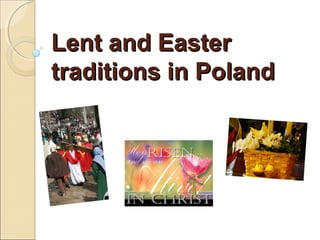
Lent and easter traditions in poland
- 1. Lent and Easter traditions in Poland
- 2. The end of carnival and the beginning of Lent Lent starts on Ash Wednesday but there are two celebrations preceding Lent which are worth mentioning. The last Thursday of the carnival is called „Fat Thursday” and Poles eat lots of doughnuts (pączki) this day. Chrust or faworki are also popular this day. The carnival ends on Shrove Tuesday known as „śledź” - the "herring feast", after the herrings eaten on that day as a herald of the coming Lent.
- 3. Palm Sunday It is celebrated to commemorate Christ's triumphant entry into Jerusalem. The main attribute associated with that day are the palms. Despite the name, they hardly resemble the real palm branches with which Jesus was greeted in the Holy City. Typically, they are bouquets of common box, dried flowers and willow twigs. Some regions are noted for particularly impressive palms, several metres high and decorated with coloured ribbons, dyed grasses, dried or artificial flowers. It is believed that a palm blessed at a mass has special properties; for example, it can prevent disease. Many competitions are also organized to build the highest or the most beautiful palm.
- 4. Holy Week Holy Thursday begins the Triduum - the time when many people gather in churches for masses and services of Maundy Thursday, Good Friday and Holy Saturday. Some places are especially famous for organizing the Mysteries of the Passion of Christ (Kalwaria Zebrzydowska is probably the most popular among pilgrims every Good Friday). On Good Friday and Holy Saturday people also come to pray kneeling in front of Tombs of Christ On Friday before the Holy Week people can also walk the stations of the Cross in the streets of their cities.
- 5. Blessing of Easter Baskets On Holy Saturday people bring baskets of Easter foods to church for a special blessing. This typically Polish tradition dates back to the 14th century and is richly symbolic and beautiful. The basket (called święconka) usually contains the following kinds of food: bread (a symbol of Christ's body), eggs (symbolize life's victory over death), salt (a life- giving mineral, once believed to keep away all evil), ham (ensures health and abundance), horseradish (a symbol of strength, and also the bitterness of the suffering of Christ),a Lamb (in Polish: Baranek – symbolizes Christ) or a bunny (a symbol of fertility and rebirth). The food from the basket is eaten after the Resurrection Mass – on Saturday evening or Sunday morning, depending on the parish.
- 6. Easter Sunday After the Resurrection Mass (usually on Sunday morning or Saturday evening, depending on the parish) families gather to have a special Easter breakfast. The food that was blessed on Saturday is eaten. Among typical Easter food there is also for example a cake called „mazurek”. On this day children get presents from the Bunny – if it is possible they have to look for them in the garden.
- 7. Easter Monday Itis called ”Wet Monday” ot śmigus- dyngus in Polish. On this day boys pour water on girls or sprinkle them with water or perfumes. Sometimes bucketfuls of water are used, sometimes just symbolic quantites. It takes place in homes and on the streets. There is a superstition that the girl who remains dry this day will not have luck throughout the year. This custom dates back to pagan times as a symbol of purification.
- 8. HAPPY EASTER! We hope you would like to visit Poland during Easter time. This was just a short presentation about the most important traditions. There are some others, typical for some parts of our country. Prepared for eTwinning project BLOGTROTTERS ACROSS EUROPE by the group from Gimnazjum nr 14 in Ruda Śląska Poland, March 2013